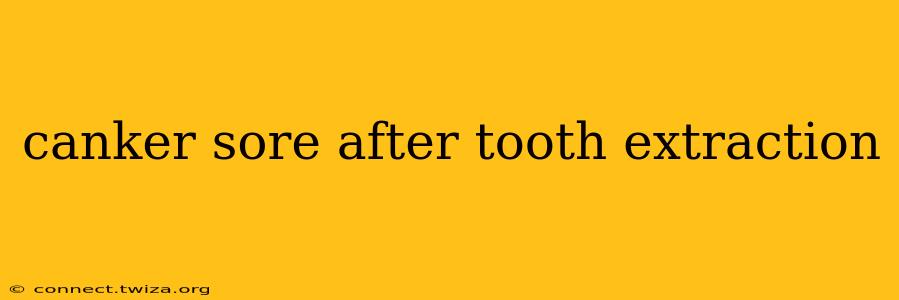Experiencing a canker sore after a tooth extraction can be incredibly frustrating, adding another layer of discomfort to an already healing mouth. While not directly caused by the extraction itself, the procedure can create an environment conducive to their development. This comprehensive guide explores the connection between tooth extractions and canker sores, offering insights into causes, effective treatments, and preventative measures.
What Causes a Canker Sore After a Tooth Extraction?
Several factors contribute to the appearance of canker sores following a tooth extraction. The process disrupts the delicate balance of your oral microbiome, creating an environment ripe for opportunistic infections.
- Trauma to the Mouth: The extraction process, while carefully performed, inevitably involves some trauma to the surrounding tissues. This minor injury can weaken the mucosal lining, making it more susceptible to canker sores.
- Stress: Undergoing a tooth extraction is inherently stressful. Stress is a known trigger for canker sores in many individuals. The body's response to stress can compromise the immune system, increasing vulnerability to sores.
- Irritation from the Extraction Site: The healing extraction site can be sensitive and easily irritated. Food particles, acidic drinks, or even the act of brushing can trigger a canker sore.
- Changes in Oral Flora: The extraction process can temporarily disrupt the natural balance of bacteria in the mouth. This imbalance can create an environment where bacteria or viruses associated with canker sores thrive.
- Medication Side Effects: Some medications prescribed after tooth extractions might list canker sores as a potential side effect. Always review your medication information carefully.
Is it Normal to Get a Canker Sore After a Tooth Extraction?
While not a universal experience, developing a canker sore after a tooth extraction is not uncommon. The factors mentioned above contribute to this increased risk. If the sore is small, superficial, and heals within a week or two, it's likely within the range of normal post-extraction healing. However, persistent or unusually severe sores warrant a visit to your dentist or oral surgeon.
How Long Does a Canker Sore Last After Tooth Extraction?
The duration of a canker sore after a tooth extraction varies depending on its size, severity, and individual healing rates. Most minor canker sores resolve within 7-10 days. However, larger or more persistent sores might take longer to heal, possibly up to several weeks. If your sore persists beyond two weeks or shows signs of infection (increased pain, swelling, pus), seek professional medical advice.
How to Treat a Canker Sore After Tooth Extraction?
Treating a canker sore after a tooth extraction focuses on pain relief and promoting healing. Over-the-counter remedies are often effective:
- Oral Anesthetics: Products containing benzocaine or lidocaine can numb the sore, providing temporary pain relief.
- Rinsing with Salt Water: A warm saltwater rinse (1/4 teaspoon salt in 8 ounces of warm water) can help cleanse the area and reduce inflammation.
- Antiseptic Mouthwashes: Gentle antiseptic mouthwashes can help prevent infection. Avoid alcohol-based mouthwashes, as these can irritate the sore.
- Canker Sore Patches: These patches create a protective barrier over the sore, shielding it from irritants and promoting healing.
How to Prevent Canker Sores After Tooth Extraction?
Prevention is key. Taking proactive steps can significantly reduce your risk of developing canker sores after a tooth extraction:
- Maintain Excellent Oral Hygiene: Brush and floss gently, avoiding the extraction site directly.
- Avoid Irritants: Stay away from acidic foods and drinks, spicy foods, and hard or crunchy foods that could irritate the healing area.
- Manage Stress: Practice stress-reduction techniques like yoga, meditation, or deep breathing exercises.
- Eat a Balanced Diet: A nutritious diet supports overall immune health.
- Keep Hydrated: Drinking plenty of water aids in healing.
When Should I See a Dentist About a Canker Sore After a Tooth Extraction?
Consult your dentist or oral surgeon immediately if:
- The canker sore is unusually large or painful.
- The sore shows signs of infection (pus, increased swelling, redness).
- The sore doesn't heal within two weeks.
- You experience fever or other systemic symptoms.
By understanding the causes, treatments, and prevention strategies for canker sores after tooth extraction, you can navigate the post-extraction healing process more comfortably. Remember, proactive care and prompt attention to any concerning symptoms are essential for a successful recovery.
